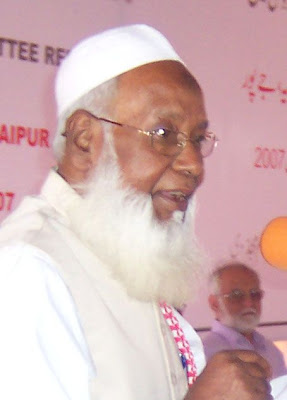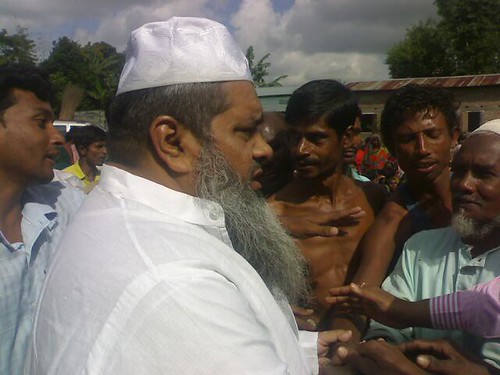By M. Burhanuddin Qasmi,
After Maulana Hifzur Rahman Seoharwi and Maulana Abul Kalam Azad both India’s stalwart freedom fighters who represented Muslims in the legislature as members of parliament, mainstream ulama were completely out of the elected house in India for the last 60 years. This time around a fresh but solid beginning is made by two Deoband alumni.
The entry of Maulana Badruddin Ajmal Qasmi with a landslide victory over his Congress rival Anwar Hussain from Dhubri Lok Sabha constituency of Assam and Maulana Asrarul Haq Qasmi from Kishanganj constituency of Bihar after winning against his RJD rival, former central minister Muhammad Taslimuddin, can be marked as the beginning of a new chapter in the electoral politics of India.

Maulana Asrarul Haq Qasmi
Prominent Muslim scholar and columnist Maulana Asrarul Haq Qasmi won the Kishanganj Lok Sabha seat with a margin of 81,125 votes defeating RJD’s senior leader Taslimuddin and JDU candidate Syed Mahmood Ashraf.
The founder president of Delhi-based All India Talimi Wa Milli Foundation, Maulana Qasmi belongs to Kishanganj and has been active in the educational uplift of the people of the area, which records one of the lowest female literacy rates in India. It was in this perspective that he set up Milli Girls School about 7 years ago.
Maulana Qasmi described his victory as the victory of the people of Kishanganj and said he would work for them and get them what they deserve.
Opening his account in India’s Parliament the Assam United Democratic Front president Maulana Badruddin Ajmal Qasmi has won Dhubri Lok Sabha seat by one lakh eighty four thousand votes.

Maulana Badruddin Ajmal
The AUDF was formed months before the 2006 assembly elections in Assam and won 10 assembly seats held that year, with 9.07 per cent vote share in the state. Later in the rural elections in 2008 the AUDF increased its vote share to 14.54 per cent with 48 ZP seats. In this Lok Sabha election the party has performed remarkably well in all 9 constituencies it contested out of total 14 Parliamentary Constituencies (PCs) in the state and received 17.10 per cent vote share out of total votes polled. AUDF is now the third major party, ahead of Assam Gano Parishad (AGP) and behind two national parties Congress and BJP which received 33.92 and 17.22 per cent votes respectively in Assam. The AUDF made an impressive first showing by winning one seat, standing second in two and scoring third place in 6 parliamentary constituencies out of total 9 it contested.
One more significant outcome of this election for Muslim Indians should be that barring Badruddin Ajmal-led AUDF and the Muslim League of Kerala, the fate of almost a dozen-odd Muslim outfits in this election has been sealed with none able to even make a mark.
Interestingly, half of these parties were born just before the announcement of the 2009 polls, hoping to ride on the community’s sympathy factor. This election is a clear indicator to the positive argument that no party or political entity can go nationally long with any exclusive community driven agenda – be it BJP, Modi, Shiv Sena or any Muslim led party. Unless it has inclusive programmes for all communities and the nation any long term success will remain a cherished dream like that of former PM in-waiting Mr. LK Advani.
Besides the Muslim League in Kerala and AUDF in Assam, the only exception has been that of Asaduddin Owaisi of Majilis Ittihadul Muslimin (MIM) from Andhra Pradesh. Owaisi managed to protect his traditional family seat of Hyderabad from the onslaught of the opposition.
Though the Congress-led United Progressive Alliance (UPA) fared much better than what was expected by all opinion and exit polls in this Lok Sabha polls, the ruling party suffered a setback in Assam as the total seats of the party have come down from nine in the 2004 polls to seven this time.
The Congress failed to retain four seats— Guwahati, Silchar, Dhubri and Tezpur only because of the AUDF factor and it also could not regained Nogoan and Mangaldoi from BJP owing to the major vote share of AUDF in both the constituencies.
The AUDF could heavily erode the traditional vote bank of the Congress in Assam which is a strong signal to the national party. And for marginalized people in Assam especially Muslims and tea garden labours it is very positive to find a solid and secular alternative to the Congress apathy towards minority interests in the state.
It is good time for the national party to read the writing on the walls. Muslims in particular are no longer a mere vote bank with the secular name tag alone. Nitish Kumar did well in this election for his inclusive good work.
In the 15th Lok Sabha election Muslims have voted strategically for Congress led UPA alliance in UP, West Bengal, Maharashtra, Andhra Pradesh and Kerala. This mature swing cannot be taken for granted like ‘coming back home of Muslim’ this time without proportionate representation and developmental measures for Muslims.
(M. Burhanuddin Qasmi is editor of Eastern Crescent and director of the Mumbai based Markazul Ma’arif Education and Research Centre. He can be contacted at [email protected])

